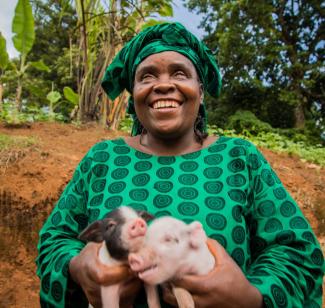Communication
Highlight hardship – but point out progress as well

Emaciated villagers, parched fields, starving livestock – everyone is familiar with the images used to generate support for charity appeals. Showing the need for help is part of virtually all fundraising efforts. Does that mean the success of charity appeals hinges exclusively on depictions of suffering? Might it even be counterproductive to show how lives are improved in the global south? Could that impact negatively on people’s willingness to donate?
It is not as simple as that. It is important, of course, to show that help is needed. No one donates money for people who have everything they need. But merely repeating reports of suffering will not work either. It is certainly no way to keep regular donors on board because at some point they will wonder what happened to the money that flowed into the project in the past and why it has done nothing to alleviate distress. Charity organisations thus need to achieve a delicate balance between highlighting hardship and pointing out progress.
All respectable charity organisations engage in detailed project monitoring. It enables them to verify and demonstrate how well they achieve their targets. Project evaluations also form an important basis for communicating successes to donors. For example, if CBM can finance more than 6,700 cataract operations in Africa, Asia and Latin America with the annual donations of roughly € 202,000 raised in the city of Freiburg, many will find that an impressive achievement. It shows that even small contributions can provide significant benefit. One operation costs € 30 on average.
Medical assistance is not the only area in which success is ostensibly easy to demonstrate. Clear and objective yardsticks are also available elsewhere, for example for livelihood building projects. Take, for instance, someone with no or little income receiving a small loan to set up a business. If after a while that borrower is able to earn a living and pay back the loan, the project is deemed a success.
But for all the understandable need for objective performance indicators, we must not forget that the primary goal is to improve people’s lives. Their subsequent quality of life must not be obscured by statistics – not in internal monitoring and certainly not in external communications.
For this reason, CBM keeps in touch with some of the people who have taken part in the programmes it finances. Mourine Yilamonyuy from Cameroon, for instance, went blind at the age of 33. How did her life change after she attended livelihood building workshops and self-help group meetings? The point is not just that she set up an animal-husbandry business that now provides her with a living. For people with disabilities, in particular, a comprehensive and lasting improvement in their quality of life means more than economic independence; it means they strengthen their social status, which makes for greater acceptance and participation in society. That gain is hard to measure objectively and express in figures.
So, the “human” aspect should not be forgotten in aid organisations’ impact assessments and communications. Nor should performance figures or the desperate suffering that still exists in large parts of the world despite all the progress made.
Esther Dopheide heads the press and information section of CBM Germany.
esther.dopheide@cbm.de







